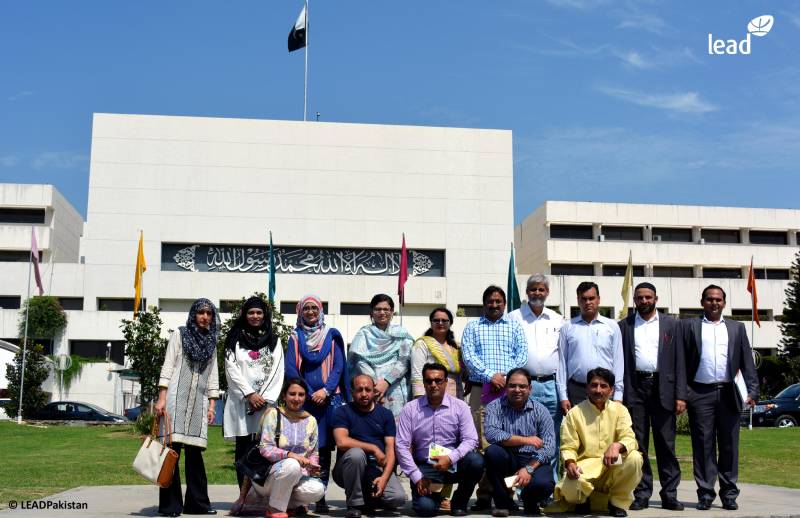ISLAMABAD- Leadership for Environment and Development (LEAD) Pakistan held the third session of Cohort 19 of Leadership Development Programme (LDP) at LEAD house. Cohort 19 is themed around Urban Resilience and Sustainable Cities, and the third session focused on Reinventing Urban Systems, Policies and Planning for Low Carbon Development.
Eminent urban sector experts, including Dr. Pervez Tahir, Ex-Chief Economist of Pakistan; Janel Salem, United Nations Environment Programme (UNEP); Dr Murtaza Bukhari, Transport Planning Development, Government of Punjab; Amjad Ali Awan, CEO, Alternate Energy Development Board (AEDB); Hasan Akhtar Rizvi, Chief Knowledge Officer, LEAD Pakistan; Dr Imran, Massey University, New Zealand;Dr Usman Mustafa, Pakistan Institute of Development Economics (PIDE); Asad Mahmood, Enercon; and Parvaiz Naim, KfW,briefed the associates during the four day session of Cohort 19, to build their understanding on issues related toUrban Systems, Policies and Planning for Low Carbon Development.
The experts also informed the associates regarding the potential benefits of transformation of urban systems, such as economy, power generation, infrastructure, transport and waste management on low carbon pathways, and the international funding, which can help the municipal and national governments to implement their urban development agenda.
Hasan Akhtar Rizvi told the associates about the need for de-carbonizing energy and the atmosphere. He discussed the approaches that are not generally the focus of mitigation debates but have the potential to transform the mitigation effort around the world. According to Hasan, these approaches include, ‘Controlled thermonuclear fusion, Carbon Capture and Storage (CCS) and the Short Lived Polluting Chemicals (SLPCs) that contribute to 40-45 per cent of the anthropogenic temperature rise, and especially the need to phase out Hydro-Flouro Carbons (HFCs).’
A field visit to the Parliament house was alsoorganized as part of the Cohort training. The associates were briefed by the representatives of the parliament’s Sustainable Development Goals (SDGs) Secretariat, on the government’s blueprint regarding SDGs in Pakistan. This was followed by a detailed presentation on the recent installation of 1.8 megawatt (MW) solar power plant at the parliament house, which made Pakistan the first country to have solarized its seat of government.
The interactive session formulated policy recommendations for decision-makers to improve resilience and sustainability of major cities of Pakistan, and aimed to build the understanding of the associates on low carbon development, expanding their knowledge base on how the low carbon development strategies be integrated with urban planning and economic growth strategies.
LEAD’s Fellowship Programme exclusively aims to build the capacity of professionals from various sectors across Pakistan. This year, the theme of Cohort 19 focuses on cities and their sustainable development, asurbanization has increased manifold, making cities vulnerable to extreme weather events, such as heatwaves, cloud bursts, flash floods and cyclones etc.
LDP is LEAD Pakistan’s most popular and vibrant capacity building programme, which has completed 18 cohorts (batches) to-date. Currently there are over 200 professionals from Pakistan and over 3,000 LEAD members across the world that have completed this program and become Fellows of LEAD’s global network.
LEAD Pakistan is a leading think tank working on policy discourse, in the fields of environment and development.
Additional Information
The international development experience since the launch of Agenda 21 in 1992 has been instrumental in shifting the pendulum of global policy debate from considering the urbanization as an unnecessary evil to necessary good and from containing urbanization to preparing for it. The policy community has moved ahead from increasing urban resilience through adaptation to compact city development for climate mitigation and from uplifting and empowerment of the poor to their integration in urban economies.
The global cooperation that resulted in unprecedented achievements in 2015 in the form of Sendai Framework on DRR, Climate Agreement in Paris and adoption of SDGs is being extended to develop the New Urban Agenda this year. The Habitat III Conference in Quito, Ecuador shall give the roadmap to operationalize SDGs (especially Goal 11) in human settlements. However, in Pakistan, the sustainable urban development remains beyond the national development agenda and cities are becoming increasingly vulnerable to a host of natural and man-made disasters. As municipalities are the weakest governance tier, the country has to pay the price in the form of missed opportunities offered through various financing, technology transfer and capacity building windows.






